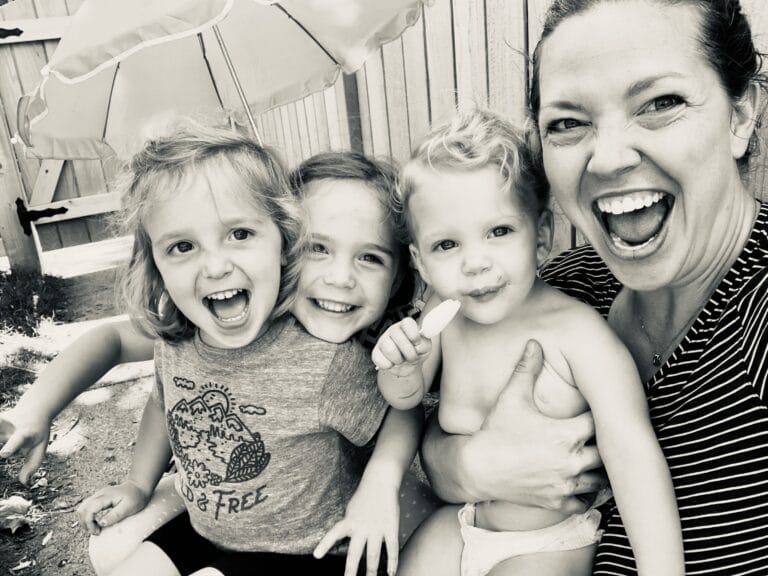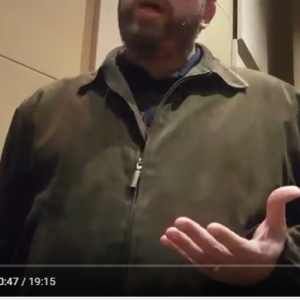Author’s note: I understand it is early to be sharing with the world such a traumatic experience. My husband and I have deliberated whether sharing such a personal view is wise, and we think that it is. My hope is that our story will be a catalyst for change.
Thirty days ago, at 13.5 weeks of gestation, my husband and I learned that our baby no longer had a heartbeat. We told our three tiny daughters that our new baby—their little brother or sister—was no longer with us.
Ten hours later, I was admitted to the hospital after I began to hemorrhage at home while lying in bed next to my 3-year-old daughter. I lost consciousness as I was wheeled into the emergency room, vomited, bled, and had many vasovagal responses where my blood pressure would drop to 60/30. I was in pain, and I felt drained.
My terrified husband, sitting next to me, anxiously asked the medical team if I would be OK. I lost copious amounts of blood, and AFTER receiving my first of three blood transfusions, my hemoglobin was measured at 5.3 g/dl. For you non-medical friends out there, that is very low. Scary low.
After a surgical procedure, thankfully, I did stabilize. We finally knew I would be OK. My husband and I are grateful that we were beautifully cared for by many doctors, nurses, and hospital staff during those challenging 48 hours.
I am fortunate to be surrounded by the most supportive community of family, friends, neighbors, and colleagues.
From the moment we learned of our loss, my family and I have been treated with unparalleled kindness, generosity, and gentleness.
In a conversation with one friend, I noted how sad it is that miscarriages are so common. She agreed but added that, despite being common, each miscarriage is so personal and so individual. Each woman, each partner, and each family has a unique experience, and every time, it is hard. It is painful. For me, as the mother, it was devastating to learn that the life inside me was no more; it was a profound absence. A silence. A stillness.
RELATED: I Had a Miscarriage
From a workplace perspective, I was in an unusual situation when I lost my baby. My family and I had been planning to leave for vacation on a remote island in Lake Michigan that evening. Because of that vacation, I was scheduled to miss a week of work, which for my part-time schedule is just two 10-hour days. Interestingly, we also had just purchased a new home, and our closing date fell on the first workday upon my return from vacation.
On top of all this craziness and change, I was beginning a new leadership program that required two full days of virtual orientation, thus causing me to miss yet another full day of work. In total, I was scheduled to be away from the office for two full weeks. I had been planning to use four days of paid time off at my beloved job while I was away.
I had not planned to miscarry and experience a medical emergency on my first of 14 days away from the office.
After I was discharged from the hospital, I reached out to my employer. While my paid time off had already been approved, the situation had obviously changed drastically. I was now healing and grieving at home instead of vacationing with my family.
As I have been throughout my eight years of employment, I was met by my leaders with support and empathy. I am again inspired by the strength, compassion, and innovation demonstrated by these courageous leaders.
Incredibly, I was granted bereavement. Moving forward after experiencing miscarriage, employees at my organization will be granted bereavement if they so choose. Importantly, both women and men will be included.
The event, though, did spark a question in me: Do organizations typically consider miscarriage under their bereavement policies?
I understand that a miscarriage is different than losing a family member who you have held, hugged, and loved. And this is a topic I admittedly had never considered as I had not previously been in this position.
I also acknowledge that my lens is one small lens. Many women and men will not agree with my perspective that miscarriage should be considered under bereavement policies. I do believe, though, that this consideration would positively impact many families in the decades to come.
I started to research organizations’ policies on bereavement after miscarriage, and I discovered it is rare for a company to offer any bereavement in a situation like mine.
Historically, miscarriage has been a taboo and private topic. For this reason, most organizations probably have not given much thought to the topic of how to best support grieving parents following this type of loss.
I am fortunate to know many strong women who, after experiencing their own miscarriages, chose to tell others about their experiences. While I am devastated to have lost my baby, I share my story so that other women (and men) know they are not alone and that their feelings are valid.
I am particularly passionate about using my voice to champion this issue because I realize not every person who experiences a miscarriage is in as fortunate of a position as I was. I acknowledge that I am extremely blessed to have such a supportive community surrounding me. I have a loving, present, and emotionally intelligent partner.
RELATED: 5 Things to Say to a Woman After a Miscarriage
I am well-educated and work in healthcare myself. I am white; my cultural and racial backgrounds are not ones that have been unjustifiably marginalized. I do not live in poverty. I have healthcare benefits and have worked for nearly a decade with an organization I love. I know how to advocate for myself. By nearly every standard except my sex, I am living a life of privilege. And this is simply and unfortunately not the truth for the majority of persons who have experienced and will go on to experience miscarriages.
Consider a single mother who works full-time in a new job. She has not accrued sufficient time off, or maybe she does not qualify for time off.
She traumatically loses and passes her baby—potentially at home, alone, or with her young children around—and then has to head back to work the next day. How is she supposed to fully concentrate on her responsibilities in the workplace the very next day when she has a host of logistical, financial, physical, and emotional ramifications to remedy?
As someone who has recently miscarried, these are only some of the questions that have run through my head . . .
How will I explain to my children that the baby has passed?
How will I cope with the loss of my child?
Did I do something wrong to cause this loss?
Who do I need to un-tell about the pregnancy?
What should we do with the baby’s corpse?
What will our medical bill look like?
When will the bleeding stop?
How much bleeding is too much?
For how long will the cramping persist?
Do I have any activity restrictions?
Am I at risk for future medical/fertility complications because of this experience?
So, with a host of these questions occupying her thoughts, how will she concentrate at work? The answer is simply that she will not be able to. But because of her situation and the fact that her unborn baby was not yet considered a part of her family, she has no option but to return to work the next day.
Clearly, there is something wrong with this situation.
A miscarriage is a traumatic, all-encompassing event for a woman and family.
As more women give public voice to the very personal and painful experience of miscarriage, I am hopeful there will be a shift in the collective understanding of and response to this particular (and yet incredibly common) type of loss. Together, perhaps we can urge policy-makers and employers to offer several days (or weeks) for employees to rest and recover, recognizing that miscarriage is not a single-day event but one that impacts and reverberates through all aspects of our lives.
No woman, still reeling from the loss of a child—a child she surely considered a family member, regardless of any employee handbook definition—should have to return promptly to work.
RELATED: How Do You Move On From Miscarriage?
Three days after I was discharged from the hospital, I learned that the pathology report had identified our baby’s sex, and my OB asked if I wanted to know. Yes, I said, I did want to learn.
A boy. (Heart breaks into a million little pieces.) I was carrying a little boy.
Our three little girls had (have) a baby brother. Samuel Jeffrey.
On my first day back to work, 15 days after I had learned that my unborn baby had died, my first patient was a new evaluation: a newborn baby boy with the most delightful, gushing parents. As I held the sweet boy in my hands, I couldn’t help but think of my Samuel.
I had been loved and lifted up by my community. I had physically recovered. I had grieved and cried with my husband. The pain had softened, and yet, it was ever-present.
Holding that tiny baby in my clinic, I was happy, and I was sad, and I was positively grateful this was not the day after I had miscarried my own child.
Miscarriage should be covered under bereavement leave.

If you liked this, you'll love our book, SO GOD MADE A MOTHER available now!
Order NowCheck out our new Keepsake Companion Journal that pairs with our So God Made a Mother book!
Order Now















